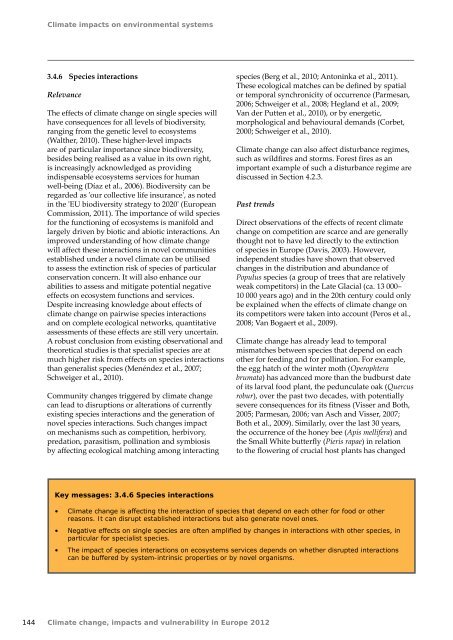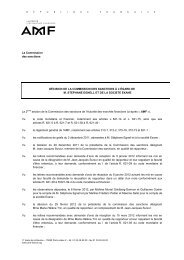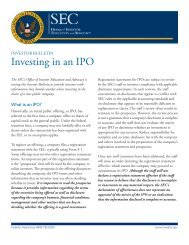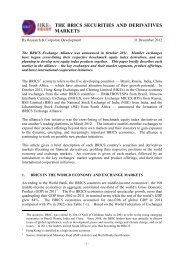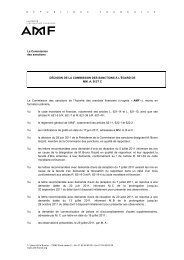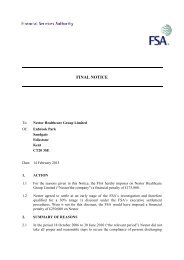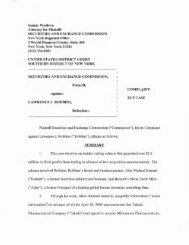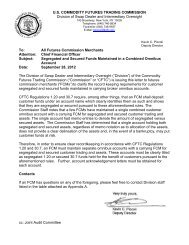Climate change, impacts and vulnerability in Europe ... - MemoFin.fr
Climate change, impacts and vulnerability in Europe ... - MemoFin.fr
Climate change, impacts and vulnerability in Europe ... - MemoFin.fr
Create successful ePaper yourself
Turn your PDF publications into a flip-book with our unique Google optimized e-Paper software.
<strong>Climate</strong> <strong>impacts</strong> on environmental systems3.4.6 Species <strong>in</strong>teractionsRelevanceThe effects of climate <strong>change</strong> on s<strong>in</strong>gle species willhave consequences for all levels of biodiversity,rang<strong>in</strong>g <strong>fr</strong>om the genetic level to ecosystems(Walther, 2010). These higher-level <strong>impacts</strong>are of particular importance s<strong>in</strong>ce biodiversity,besides be<strong>in</strong>g realised as a value <strong>in</strong> its own right,is <strong>in</strong>creas<strong>in</strong>gly acknowledged as provid<strong>in</strong>g<strong>in</strong>dispensable ecosystems services for humanwell-be<strong>in</strong>g (Díaz et al., 2006). Biodiversity can beregarded as 'our collective life <strong>in</strong>surance', as noted<strong>in</strong> the 'EU biodiversity strategy to 2020' (<strong>Europe</strong>anCommission, 2011). The importance of wild speciesfor the function<strong>in</strong>g of ecosystems is manifold <strong>and</strong>largely driven by biotic <strong>and</strong> abiotic <strong>in</strong>teractions. Animproved underst<strong>and</strong><strong>in</strong>g of how climate <strong>change</strong>will affect these <strong>in</strong>teractions <strong>in</strong> novel communitiesestablished under a novel climate can be utilisedto assess the ext<strong>in</strong>ction risk of species of particularconservation concern. It will also enhance ourabilities to assess <strong>and</strong> mitigate potential negativeeffects on ecosystem functions <strong>and</strong> services.Despite <strong>in</strong>creas<strong>in</strong>g knowledge about effects ofclimate <strong>change</strong> on pairwise species <strong>in</strong>teractions<strong>and</strong> on complete ecological networks, quantitativeassessments of these effects are still very uncerta<strong>in</strong>.A robust conclusion <strong>fr</strong>om exist<strong>in</strong>g observational <strong>and</strong>theoretical studies is that specialist species are atmuch higher risk <strong>fr</strong>om effects on species <strong>in</strong>teractionsthan generalist species (Menéndez et al., 2007;Schweiger et al., 2010).Community <strong>change</strong>s triggered by climate <strong>change</strong>can lead to disruptions or alterations of currentlyexist<strong>in</strong>g species <strong>in</strong>teractions <strong>and</strong> the generation ofnovel species <strong>in</strong>teractions. Such <strong>change</strong>s impacton mechanisms such as competition, herbivory,predation, parasitism, poll<strong>in</strong>ation <strong>and</strong> symbiosisby affect<strong>in</strong>g ecological match<strong>in</strong>g among <strong>in</strong>teract<strong>in</strong>gspecies (Berg et al., 2010; Anton<strong>in</strong>ka et al., 2011).These ecological matches can be def<strong>in</strong>ed by spatialor temporal synchronicity of occurrence (Parmesan,2006; Schweiger et al., 2008; Hegl<strong>and</strong> et al., 2009;Van der Putten et al., 2010), or by energetic,morphological <strong>and</strong> behavioural dem<strong>and</strong>s (Corbet,2000; Schweiger et al., 2010).<strong>Climate</strong> <strong>change</strong> can also affect disturbance regimes,such as wildfires <strong>and</strong> storms. Forest fires as animportant example of such a disturbance regime arediscussed <strong>in</strong> Section 4.2.3.Past trendsDirect observations of the effects of recent climate<strong>change</strong> on competition are scarce <strong>and</strong> are generallythought not to have led directly to the ext<strong>in</strong>ctionof species <strong>in</strong> <strong>Europe</strong> (Davis, 2003). However,<strong>in</strong>dependent studies have shown that observed<strong>change</strong>s <strong>in</strong> the distribution <strong>and</strong> abundance ofPopulus species (a group of trees that are relativelyweak competitors) <strong>in</strong> the Late Glacial (ca. 13 000–10 000 years ago) <strong>and</strong> <strong>in</strong> the 20th century could onlybe expla<strong>in</strong>ed when the effects of climate <strong>change</strong> onits competitors were taken <strong>in</strong>to account (Peros et al.,2008; Van Bogaert et al., 2009).<strong>Climate</strong> <strong>change</strong> has already lead to temporalmismatches between species that depend on eachother for feed<strong>in</strong>g <strong>and</strong> for poll<strong>in</strong>ation. For example,the egg hatch of the w<strong>in</strong>ter moth (Operophterabrumata) has advanced more than the budburst dateof its larval food plant, the pedunculate oak (Quercusrobur), over the past two decades, with potentiallysevere consequences for its fitness (Visser <strong>and</strong> Both,2005; Parmesan, 2006; van Asch <strong>and</strong> Visser, 2007;Both et al., 2009). Similarly, over the last 30 years,the occurrence of the honey bee (Apis mellifera) <strong>and</strong>the Small White butterfly (Pieris rapae) <strong>in</strong> relationto the flower<strong>in</strong>g of crucial host plants has <strong>change</strong>dKey messages: 3.4.6 Species <strong>in</strong>teractions• <strong>Climate</strong> <strong>change</strong> is affect<strong>in</strong>g the <strong>in</strong>teraction of species that depend on each other for food or otherreasons. It can disrupt established <strong>in</strong>teractions but also generate novel ones.• Negative effects on s<strong>in</strong>gle species are often amplified by <strong>change</strong>s <strong>in</strong> <strong>in</strong>teractions with other species, <strong>in</strong>particular for specialist species.• The impact of species <strong>in</strong>teractions on ecosystems services depends on whether disrupted <strong>in</strong>teractionscan be buffered by system-<strong>in</strong>tr<strong>in</strong>sic properties or by novel organisms.144 <strong>Climate</strong> <strong>change</strong>, <strong>impacts</strong> <strong>and</strong> <strong>vulnerability</strong> <strong>in</strong> <strong>Europe</strong> 2012


